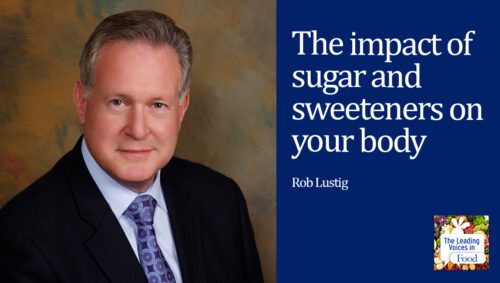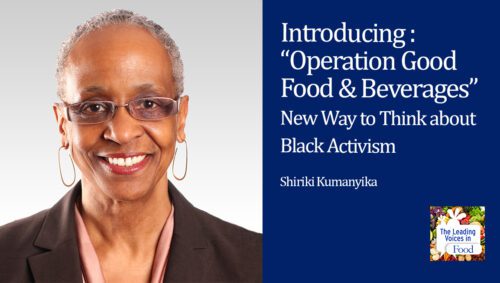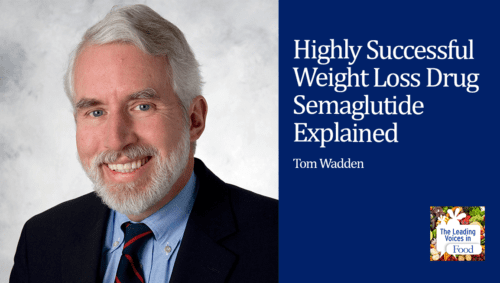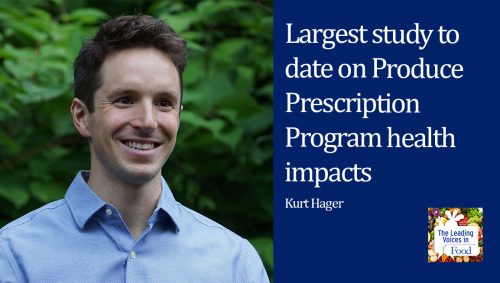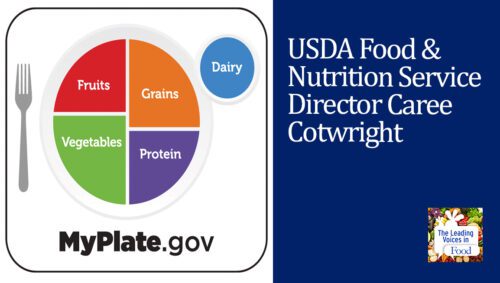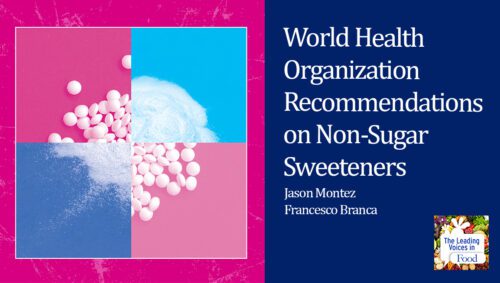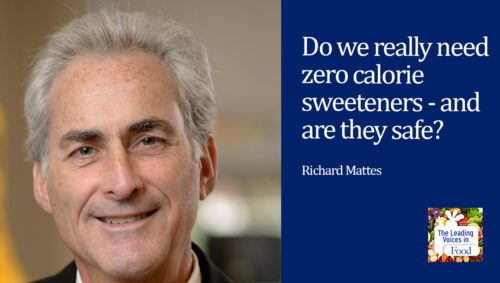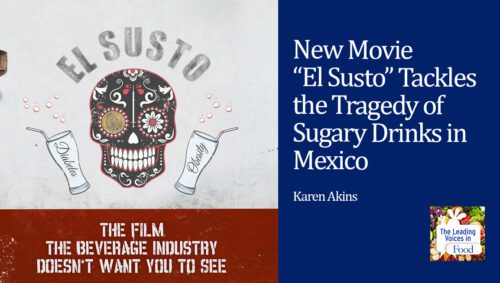The Leading Voices in Food
E152: The Underrated Power of Self Talk and Self Care in Weight Loss and Wellness
Our guest today is Dr. Gary Foster, Chief Scientific Officer of WW, the company that many of us remember as Weight Watchers. Gary is one of the most respected scientists in the obesity field and is the author of a book released recently called “The Shift: 7 Powerful Mindset Changes for Lasting Weight Loss.”
Subscribe: Apple Podcasts | TuneIN | Google Podcasts | SoundCloud | PocketCasts | Radio Public
Tags: Addiction & Food | Childhood Obesity | Obesity | Weight Stigma |

Gary Foster, Ph.D., is the Chief Scientific Officer at WW International, Inc. Foster, a psychologist, obesity researcher and behavior change expert, was previously the Founder and Director of the Center of Obesity Research and Education and Laura Carnell Professor of Medicine, Public Health and Psychology at Temple University in Philadelphia. Prior to Temple, he served as the Clinical Director of the Weight and Eating Disorders Program at the University of Pennsylvania School of Medicine. He has authored more than 225 scientific publications and three books on the causes, prevention and treatment of obesity. Foster has received numerous honors including President of The Obesity Society, Honorary Member of the Academy of Nutrition and Dietetics, Outstanding Contributions to Health Psychology from the American Psychological Association, and the Atkinson-Stern Award for Distinguished Public Service from The Obesity Society. Dr. Foster’s current focus is on scalable, evidence-based approaches to wellness for adults and children in community settings. Foster earned his Bachelor of Arts degree in Psychology from Duquesne University, an M.S. in Psychology from University of Pennsylvania, and a Ph.D. in Clinical Psychology from Temple University.
Interview Summary
So Gary, you and I have known each other now for about 40 years, having worked together at the University of Pennsylvania at the early stage of careers for both of us and I’ve always admired your work and was eager to read your new book and I expected that it would break new ground, and in fact it did. And it’s not a topic that hasn’t been written about a lot, so it was interesting to see how you would handle these issues. So, I’m so glad you can join us. We look forward to digging into the book. Thanks so much for being with us.
My pleasure, Kelly, great to be with you. I was just thinking in preparation for this conversation that you were the person responsible for starting my career. You actually gave me my first job at Penn. So, for that I’ll always be grateful.
Well, I mean, that can’t feel anything but good because your career has been amazing and you’ve accomplished and contributed so much. And it’s been really fun to be friends and colleagues over all these years so I guess it’s been a real source of pride for me. So, let me ask a career question of you. So, you spent many years as a highly regarded figure in academics, first at the University of Pennsylvania and then running a well-known obesity center at Temple University that you created but then you moved to the corporate world. Why make such a big career change?
Yeah, it was an interesting process. I loved everything about what I was doing as a researcher and a clinician, and administrator, and academia both at Penn and at Temple and the opportunity at WW came up and I was actually approached and someone asked that I know somebody who would be suitable. And the more I heard about the position, the more it excited me. And the main reason is the ability to scale science and to have impact. One of the nice things about being a scientist and write papers and give talks is that you’re actually creating science, and that has its own impact. And again, I’m not knocking it. That was one of the most gratifying things I ever did in my professional life. But the ability to take that science that I had done and broadly the whole field had done, and to scale that to impact the lives of literally millions was really compelling for me and it was just an offer I just couldn’t pass up.
Well, it’s so interesting that you made that change and you’re right boy, it’s an opportunity to affect an awful lot of people and now you are expanding the opportunity even more with your new book. So, usually, in the world of advice written by professionals, and sometimes non-professionals, for people wanting to lose weight, it’s filled with basically information on what the diet should be. Is it low carb or high carb or low fat or whatever. And there’re just versions and versions and versions of these things over the years but you focus on mindset. So, what goes into the way a person’s thinking is a really important determinant of weight loss according to you. So, tell me why you believe that and why is mindset so important?
Yeah, I think first is the world doesn’t need another diet book. To your point, most people, when they think of improving their weight or health or their overall wellness are told things like high this, low that as you just referenced. Then, what’s been clear to me and this wasn’t clear early in my career, but probably 10 or 15 years in patient after patient, study after study, what became clear is the people who were most successful in a weight and wellness journey are necessarily those who track their food intake every day or every week, or lost weight in some linear fashion, who worked out just as they had prescribed. Well, eating and activity were important. The thing that most distinguished people who were successful versus those were less successful are the people who had changed the way they thought and importantly, the way they thought about themselves and the way they thought about the journey. And that’s really what the book’s about, it’s trying to help people think differently about themselves especially among people who are heavily stigmatized based on their weight and shape, but also to think about the journey because one of the most common off-ramps is when people had setbacks then they think in some erroneous ways that aren’t helpful for overall health and wellness.
So, we’ll get back at setbacks in just a minute. But first I’d like to ask you the following question. It sounds like you have abundant personal and clinical experience working with individuals suggesting that the way people think is an important determinant of whether they can lose weight and keep it off. Is there a research that supports that as well?
Yeah, but there’s no long-term clinical trials on that. We’re now just starting to measure things like self-compassion and our own clinical trials. What we find is a lot of experimental research. Kristin Neff has probably done the best work at this at the University of Texas where she can experiment totally manipulate self-compassion in the context of eating. So, there’s a famous experiment that she talks about where people come in and they’re given a classic preload where they’re given some cookies under the guise of the taste test and then one group gets a self-compassion intervention and the other group gets a more general intervention having nothing to do with self-compassion. And when they look at the subsequent intake of things like M&M’S or various candies, people who get the self-compassion intervention actually less, and the hypothesized mechanism there is that if you violate some rule that you have or some guideline that I shouldn’t eat this or I shouldn’t eat that or I have to have a certain number of calories or a certain number of points, once you violate that, what you say to yourself really does matter. It goes back to the original premise and 60 years of research that what you think determines how you feel and how you feel determines what you do. So in short, how you think about yourself in the journey is going to affect your behavior.
That leads us to maybe a little bit more thorough discussion of setbacks. You mentioned that dealing with setbacks, which really are inevitable for sort of anybody doing anything but especially when they’re on a weight loss journey that how people are responding to these in their mind becomes really important.
The first is to expect setbacks. They happen to 100% of the people, 100% of the time and this isn’t just a weight and wellness play. This is in relationship and our role as parents and our role as workers in a workforce. It never goes perfectly. So, first thing is to expect them and then the second thing is to learn from them. Use it as Carol Dweck would say, use it from a growth mindset perspective. Instead of saying, “This is just the way it is, I’m in this rut and here I go again.” Just say, “Okay, things didn’t go as exactly as I planned, I wanted to eat this and I ate that. I wanted to move my body in a certain way and it didn’t happen.” Okay, can you view that? Be aware of it but in a nonjudgmental way in which you can learn. I think the other thing about setbacks that’s important is to just increase your awareness of what you say to yourself. Sometimes we say the most nasty things to ourselves. Some are neutral like I’ve blown it. It’s exaggerated, it’s not true but others are like, “Can’t believe you did this. You’re such an idiot. Here you go again, you have no willpower.” We wouldn’t utter those things to any other human being, but somehow we feel justified to say very nasty things to ourselves. If it helped it be one thing, it would still be in my mind unconscionable to talk to yourself that way. But the data are very clear, it doesn’t help. It actually depletes motivation. And it goes against this commonly held myth that the harder I am on myself, the more nasty things to myself, the better I’ll do when in fact the data are pretty clear that self-compassion beats self-criticism every single time.
It’s interesting because this sounds like a very modern and updated version of what the well-known psychologist talked about many years ago where he talked about people having the inevitable lapses but then it really was the way they were processing them psychologically that turned them into a full-blown relapse. And so, you’ve kind of taken that basic premise but enriched it a lot, given people more concrete ways of addressing and then also layering in this whole emotional part of it about compassion. It’s very impressive how that’s transformed over the years.
Thanks you, I agree. I mean, probably from my exposure to you and training by you was very aware of my lapse model and the abstinence violation effect. And really it’s trying to get at the crux of when people have setbacks, how do they view them? And one is how you view the setback itself. Is it a bump in the journey? Does it really say something about how you’re doing on the journey overall? I would say, no, it’s a bump that tells you nothing about the overall journey. It’s a momentary snapshot but also importantly, I think this is where a slightly different angle than previous theories perhaps is how you think about yourself. The more you engage in self-criticism, the worst is going to be.
So, this issue of compassion has come up a number of times in our discussion already. Let’s talk about it a little bit more because I think it’s really one of the most important and unique parts of your book. You talk a lot about compassion and kindness toward yourself, these are central themes. And you also want readers to feel this more often when they’re addressing the inevitable setbacks. So, explain a little more concrete detail how they can go about doing that.
Yes. One of the things that I’m really proud about the book is that we don’t just talk about self-compassion is important and here’s some science on it and here’s a reason to believe and good luck to you. As a behavioral psychologist, it’s really important to me to not just lay out the what, but the how. So at the back of each chapter, whether it’s a self-compassion chapter, leaning into your strengths or experiencing happiness and gratitude, all of those things have science proven techniques at the back of each chapter to help you do that. So, the basic premise around self-compassion is you need to start the journey from a fundamental sense of worth as people are right now. So, no qualifications. If I was a little bit lighter, if I was a little bit fitter, if I was a better parent, if I… Not, just as you are right now, you have fundamental worth and that’s why you’re worth taking care of. And that’s to me the cornerstone of any self-improvement project whether it’s weight-based, wellness-based, relationship-based or anything else. And what that does is it turns the journey upside down. Instead of seeing yourself as deficient from the start and needing some remediation of all these deficiencies, you’re really saying, “I’m worth taking care of.” And because I am, that’s why I’m going to engage in this. And what that does is this now makes something, feels like something you’re doing for yourself, not against yourself. It’s almost the analogy I say in the book it’s like giving a gift to yourself. If this starts to feel like making up for past transgressions, it starts to feel moralistic. It starts to feel onerous. That’s not a gift to yourself. And it probably is started with the premise that the harder I’m on myself, the better I’ll do. And again, the science is just the opposite.
Well, it’s almost like going from swimming against the tide than going with the tide, isn’t it? Because you’re trying to take advantage of people’s inherent strengths and have them feel that they deserve these sort of things. And then, the actions that they’re taking are trying to fight off some evil force that makes people want to eat more but to do things that are nurturing and informing.
Exactly, exactly. One of the techniques we talk about in the book is how you would talk to a friend given the same situation and think about your body postures, think about the words you would use, how you would talk to your child who is having a setback and contrast that against the ways you talk to yourself. And there’s a pretty big fundamental difference for most people on a weight and wellness journey. And you’re so right in terms of leaning into your strengths and otherwise it becomes a game of whack-a-mole where here’s the deficiency, here’s the weakness. It’s exhausting and it doesn’t feel like it’s a gift you’re giving to yourself. It feels like you’re in never ending search of fixing one weakness after another.
So, what role does a person’s social network play in losing weight and maintaining it?
It’s critically important and your work many years ago sort of highlighted this in an empirical way where people had so-called at the time cooperative spouses and uncooperative spouses. And I think the field has evolved over time but there’s certainly a few tenants that I think are important to consider when it comes to getting help. One is to believe that you deserve help. A lot of people say again, given the pervasive weight and shape based stigma that you know well about, been a pioneer in talking out against and studying its causes and consequences. A lot of people feel like, “I got myself into this situation, so I shouldn’t ask for help.” So again, that’s the antithesis of self-compassion. So, start at a place that you’re worthy of taking care of and you’re worthy of asking help for it. The next step is really, and this is where most people I think get off track a little bit, is to ask for what you need in very specific terms. So, it’s up to you to decide what’s supportive and what’s not, one of the landmines that can happen in relationships sometimes as people say, “Honey, please be supportive.” And then honey gets to decide what’s supportive or not, which may not be supportive to you. So, it may be things like, “When I order a dessert out of the restaurant, it’s really not helpful for me when you roll your eyes or you make a comment, that’s not helpful. So, I’d appreciate it in the future but if I order anything whether you think I should have it or not then you just don’t make any comments about it.” So, the first is that specific request and then of course the next step would be a specific follow-up. Not, “Honey, thanks for being supportive.” Or, “You’re a terrible partner because you’re not supportive. But anyway thanks so much, I noticed when I ordered something the other night, you didn’t make a comment.” Or “Truly helpful for me, if you’re going to have ice cream at night to have it in the other room and not to have it close to me while we’re watching TV.” So, first thing is you deserve it and the second thing is specificity both on the request and then on the follow up.
It’s really nice that you begin with a principle and describe why the principle is so important and justify it scientifically but then you give some very concrete examples, like you just have. So, that makes a book way more accessible than it might otherwise be. And I could see how we’re be very helpful for people. Let me ask about another issue that you alluded to. And so, the subtitle of your books last chapter is “Experiencing Happiness and Gratitude.” Again, this is something that makes your book unique. Tell us more about what you mean by that.
A common myth and practice is that people often put their own lives on hold or put their happiness on hold as if their happiness is determined by some number on the scale or some size of their clothing. So, what the book really attempts to do is to say the more the journey can be, and this goes again for any self-improvement journey, can be a happy one and one filled with gratitude. A, you’re just happier when you’re more grateful, that’s a good thing to be in and out of self. But B, it gives fuel to the journey. So, if I have this preset notion that I can only be happy once I’ve lost 50 pounds, boy, it’s a long time between now and 50 pounds. And really, is that what determines your happiness? So, one of the things we talk a lot about in the book again are these techniques at the end of each chapter and there’s a really great technique called three good things. It takes no more than five minutes a day and it doesn’t have to be done every day. But if on most days at the end of the day, it could be at the beginning of the day, it could be at meal time, whatever it can be a ritualized routine for folks, it’s truly important just to think about big, small, medium, don’t worry about it. What brought you some pleasure today? It could be the smell of a great cup of coffee. It could be hearing from an old friend and just to wallow in those feelings and just think about what you’d liked about it. It could be some moment of pride around a young child having an accomplishment, just that process of remembering them and wallowing in it for a very short period of time has been empirically shown to improve people’s happiness. So, the idea is to do those things now. The things that we’ve both heard from patients over the years like, “I’ll wear nice bright colors when I lose weight, I’ll get out of a bad marriage when I lose weight, I’ll ask for a promotion when I lose weight.” No. Live life now. Lean into your own happiness. You deserve to be happy and don’t make a contingent on your weight or shape or any other thing.

